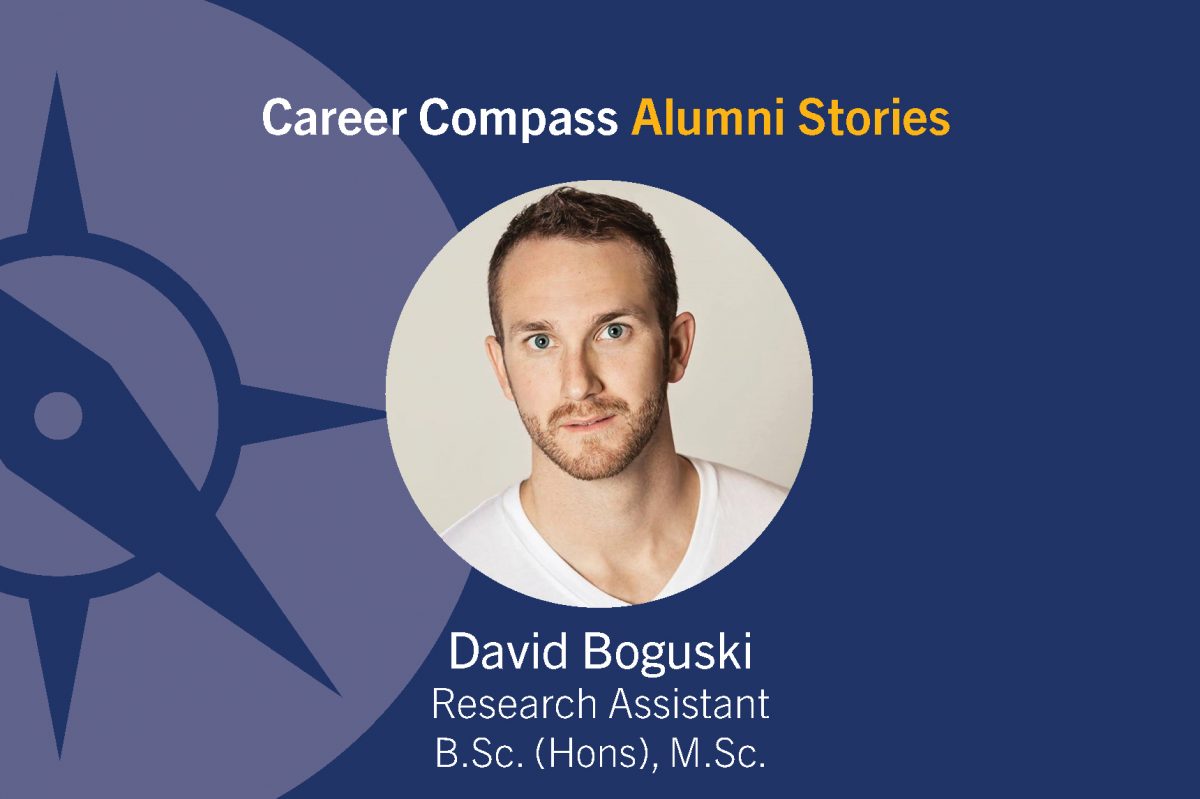
David Boguski Life Sciences Alumni
Briefly, tell us about your job. What do you find most rewarding? What are your greatest challenges within this profession?
I am a research assistant at the University of Manitoba in the department of biological sciences. My research explores the molecular genetics of mosquito sexual differentiation. By identifying the genes involved in mosquito development, we can subsequently disrupt their expression and their products in an effort to control some of the most serious disease vectors. I am also the founder of Biodive Scientific Inc., a company specializing in fisheries and aquatic science research. I manage multidisciplinary fish-related programs ranging from single-unit assessments, such as species at risk, to large-scale biological surveys.
The technical advances in molecular biology yield tools that are often transferrable within the multi-faceted study of science. The most rewarding aspect of my career is the knowledge that the discoveries and advances I have made, or contributed to, in science, will supersede my time on earth – my career gives me a sense of purpose. I am rewarded each day knowing that I have the luxury of working in an environment that fosters creativity and exploration. The greatest challenge within this profession is the utility value of key science subjects relative to their difficulty. Constraints that accompany research such as limited time, resources, and knowledge of opportunities, make it challenging to acquire proficiencies. Basic research in Canada is not well funded and opportunities in science are highly competitive and often closely allied to industrial programs with an already saturated workforce. Accordingly, the over-abundance of highly qualified young researchers without jobs persists and these individuals often resort to short-term employment and/or contract work. A career in science requires flexibility, versatility and adaptability to meet market demand.
What experiences and activities helped you to map out your career pathway?
From an early age, I became fascinated with the natural world – always keen to catch insects, fishes, reptiles and amphibians. My respect for Mother Nature and passion for the outdoors was instilled in me by my parents who encouraged activities such as hunting, fishing, hiking, canoeing. I continued my pursuit of knowledge in natural systems throughout my undergraduate and graduate degrees where I would work tediously at the bench and in the field to delve more deeply into biology. My experiences travelling and working in Canada’s most remote and rugged regions, as well as the intellectual advances in biology, have helped shape my career pathway. From the start of the adventure up to the present, I have journeyed along the road of discovery.
As a student, did you see yourself in your current career? What stayed the same and/or changed?
Yes. I have always seen myself following a career in biology. Little has changed, in that, I find my work immensely rewarding and exciting.
What advice do you have for students who are interested in pursuing a degree in biological sciences?
It may sound cliché, but pursue your passion. I never find waking up in the morning difficult knowing that I am doing something that I love. Developing your skills in science communication (writing, public speaking, leadership, project management and teaching) and building and maintaining a professional network will set you apart from your peers and allow you to excel along your career pathway.
What job search advice do you have for students and recent graduates?
First, establish what it is about science that most interests you and align your interests with those of other people who are currently working in that particular scientific field. Then, build your skill-set by networking, volunteering, taking courses, working over the summers. Also, take advantage of the Career Mentor Program. It is no longer practical to do only fieldwork as a career in biology, so if field studies are your passion, ensure you develop complementary skillsets. Do not be afraid to pick up the phone and ask for guidance. Remember, potential employers are looking for two key things: your competency in the position for that you are applying and your ability to work well with others. The key to job searching is perseverance.
Tell us a fun fact about your career path.
I have been fortunate enough to participate in multiple Canadian Arctic fisheries research programs. I have had no shortage of wonderful adventures and exposure to various cultures. One fun fact that comes to mind is that I have enjoyed many a night sleeping outside in a quinzhee or igloo. You would be surprised at how warm it is inside your shelter when it is so cold outside.






